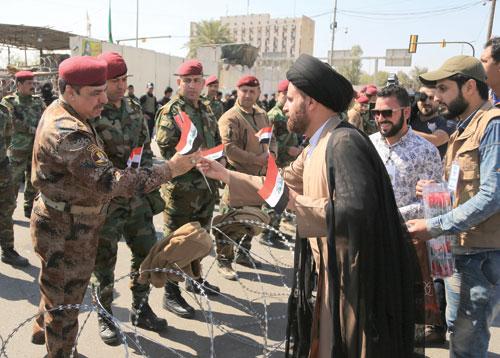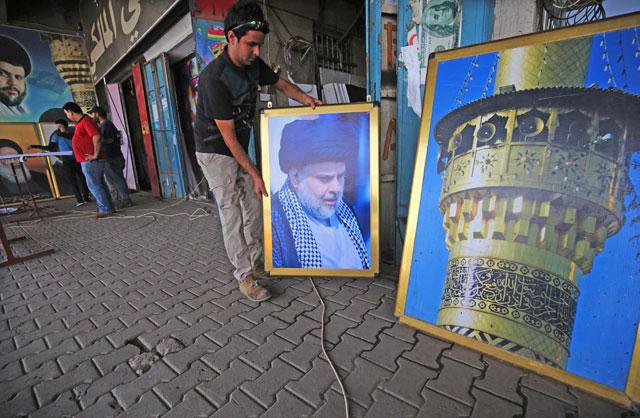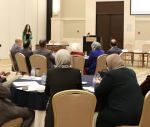You are here
As Iraqi civilian rule weakens, Shiite clerics call the shots
By Reuters - Mar 20,2016 - Last updated at Mar 20,2016

Shiite cleric Ibrahim Al Jabiri, director of Muqtada Al Sadr’s offices in Baghdad and northern provinces, hands an Iraqi flag to security forces, as a gesture of cooperation between protesters and troops, during a sit-in by Sadr supporters outside the heavily secured Green Zone in Baghdad, on Saturday (AP photo)
BAGHDAD — With Iraq's politicians tainted by corruption and the army's standing hurt by battlefield defeats, two Shiite clerics have re-emerged as leaders in matters of state.
In their different ways, Grand Ayatollah Ali Al Sistani and Hojatoleslam Moqtada Al Sadr, Iraq's two most influential Shiite leaders, are pressuring Prime Minister Haider Al Abadi to tackle graft at the heart of Iraq's government.
The timing of their intervention is delicate.
If Abadi fails to satisfy Sistani and Sadr by delivering long-promised anti-corruption measures, his government may be weakened just as Iraqi forces are gearing up to fight for the largest city under Daesh control — Mosul.
In recent weeks both clerics have increased pressure on Abadi. Sistani signalled his displeasure in January by saying his voice had "become sore" with repeating his calls for reforms. On February 5, he said he would no longer deliver weekly sermons about political affairs, and he has been only addressing religious matters since.
Sadr followed up by escalating street protests.
Unlike in neighbouring Iran “there is no role in the Iraqi constitution for the clerics”, said Sajad Jiyad, a Baghdad-based political analyst who advises the government. “They are playing an increasing role because the political class is discredited and no strongman can rise from the army like in the past.”
While the two men may share a mission, their differences are stark.
Sistani is a reclusive octogenarian based in the holy city of Najaf, who has no formal political power, but whose teachings command authority for millions of Shiites. Sistani expresses his displeasure through silence.
The 42-year-old Sadr, who rose to prominence when his Mahdi Army battled US troops after the 2003 invasion, has been more direct, setting Abadi a 45-day ultimatum to deliver on his reform promises.
Abadi has shown a willingness to act but has been slow to deliver. A plan to replace his ministers with independent technocrats, for example, was subsequently watered down. Sadr insists radical change is needed.
After staging weekly demonstrations in Baghdad, his followers started a sit-in on Friday at the gates of Baghdad’s fortified Green Zone district that houses government offices, parliament, embassies and international organisations.
Branding the district a “bastion for supporting corruption”, Sadr urged his followers to remain peaceful.
Sistani’s office declined comment for this story.
A politician close to Sadr, lawmaker Dhiaa Al Asadi who heads the parliamentary bloc that supports Sadr, spoke of “an intuitive agreement” between the two clerics on reforming the state.
‘A sort of harmony’
“There’s no such direct coordination, but there is a sort of harmony because Sayyid Moqtada Al Sadr...needs to make sure that whatever he pronounces doesn’t contradict with what...Grand Ayatollah Sistani wants,” said Asadi.
The two clerics were communicating “from time to time” through their offices, he added.
According to Jiyad, Sistani and Sadr complement one another. “Grand Ayotallah Sistani is reserved and has a moral and religious influence ... Sadr is vocal, politically active, and can mobilise people on the ground,” he said.
It is not the first time that Sistani has influenced the political agenda since the army’s collapse before Daesh militants two years ago. He forced out prime minister Nuri Al Maliki after an eight-year premiership which alienated Sunni Muslims and saw corruption set in among senior army officers.
All it took for the Grand Ayatollah to oust Maliki was to say, in a Friday sermon delivered by one of his representatives, that politicians “should not cling to positions”.
The move against Maliki, a close ally of Iran, showed Sistani’s independence from authorities in Tehran. Although of Iranian origin, he is opposed to the late Ayatollah Ruhollah Khomeini’s concept of Velayat-e Faqih, or clerical rule.
Sadr has also spent time in Iran, but is positioning himself as an embodiment of Arab Shiism that is more acceptable to the Sunnis as they are historically attached to the Arab world.
“Sayyid Moqtada al-Sadr measures very well the relationship between Iraq and the neighbouring countries,” said lawmaker Asadi. “He is not against anybody, but he’s against corruption and whoever is the source of corruption.”
‘No violence’
The Shiite-led governments which have ruled Iraq over the past 12 years have failed to improve living standards substantially and the sharp fall in the price of oil — Iraq’s main revenue earner — has made those failures more acute.
Iraq, with crude oil reserves among the largest in the world, ranked 161 out of 168 in Transparency International’s Corruption Perceptions Index in 2015.
The parliament’s Commission of Integrity, which investigates kickbacks and bribery accusations, has said that in 2015 it handled 13,067 cases involving nearly 4,000 civil servants and government officials, of whom 18 were current or former ministers. The only former minister arrested was a Christian who held the environment portfolio.
“They kept stealing and now that the oil money is no longer enough, they turn to our pensions and salaries,’’ said Abu Aliaa, 67, the owner of a fruit shack in the central Karrada district, referring to a government plan to cut pay in order to plug the public deficit. “They will never be full and that’s why the protests won’t stop unless we get rid of them.”
On March 10, Sadr formally announced his mission as guardian of good governance when he called on his supporters to rally in Baghdad in a statement that ended with a new title: The people’s servant and the fighter of corruption.
Abadi voiced concern that the street protests could spin out if control and put the nation’s security in danger when it needs to keep its focus on fighting Daesh.
Sadr has sought to calm fears of sectarian bloodshed of the kind that happened a decade ago, when his Mahdi Army militia was accused of forming death squads targeting Sunnis and Shiite opponents. “No clashes, no weapons, no cutting off roads, no assaults, no disobedience,” he told followers.
Analyst Jiyad says Sistani, who has no political ambitions, may not support Sadr in case of a further escalation on the streets. “Sistani wants change while keeping the government stable,” he said. “He won’t back Sadr should he choose to escalate street protest in a way that would threaten order or causes a vacuum.”
Sadr’s protests may last until the end of March, the end of the 45-day ultimatum to Abadi to form a government made of technocrats not affiliated with political parties. Beyond that, the cleric plans to challenge the prime minister in a no- confidence vote in parliament.
And although his bloc in parliament does not have a majority to vote down Abadi should the other parties support the premier, Sadr said he could easily sustain pressure on the prime minister by mobilising grassroots supporters to continue their protests, possibly to breach into the Green Zone. His followers had, he said, methods besides the sit-in that were no less effective.
Related Articles
BAGHDAD, Iraq — The United States has contacted members of a political bloc in Iraq led by a former foe, the Shiite cleric Moqtada Al Sadr,
BAGHDAD — Iraq's main Shiite groups on Sunday voiced support for Prime Minister Haider Al Abadi's plan to overhaul the government and combat
BAGHDAD — Powerful Iraqi Shiite Muslim leader Moqtada Al Sadr entered Baghdad's Green Zone, the heavily fortified centre of the capital hous

















